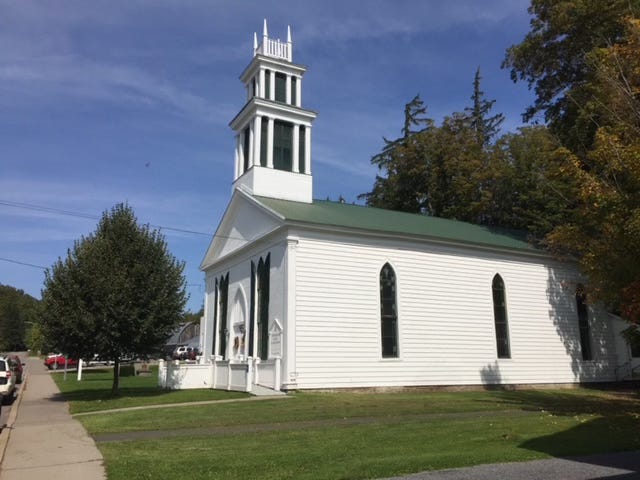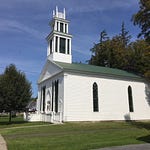Dear Friends,
For your consideration, here is Part II of various excerpts from my one-person play, A Heart Strangely Warmed.
We pick up midstream in the play, so if you’ve not done so and now have the time, you might want to listen to Part I, which was posted two weeks ago.
And welcome to any new subscribers we may have from the Global Methodist Church. May Wesley’s words be an inspiration to you as you prepare for your international conference in San Jose, Costa Rica, Sept. 20-26. Our prayers are with you.
Without further adieu, let’s go back a quarter-of-a-century or so ago to the life, and times, and faith of Oxford don and evangelist extraordinaire—John Wesley—in A Heart Strangely Warmed, Part II.
Pressing On!
D. Paul
A Heart Strangely Warmed, Part II
Ahhhh…behold the amazing love of God to the outcasts of men. They would regard nothing done in the usual way. The ordinary preaching of the Word of God they would not even deign to hear. So the devil made sure of these careless ones, for who should pluck them out of his hand; for it was an age of beastliness and debauchery, of wanton violence. The moral fiber of the nation was virtually decayed. But then God was moved to jealously, and went out of the usual way to save the souls which he had made; and so there began a reformation—not of opinions (feathers, trifles, not worth the naming), but a transformation of men’s tempers and lives, of vice in every kind, of everything contrary to mercy, justice, and truth: and so the habitual drunkard that was is now temperate in all things; the adulterer now flees fornication; he that stole, steals no more, but works with his hands; he that cursed or swore, perhaps at every sentence, has now learned to serve the Lord with fear and rejoice unto Him with reverence. If you doubt it, go to Kingswood and Cornwall; go to Newcastle, Coleford, Wednesbury, and Whitehaven; go to Leeds, Sheffield, Manchester and Liverpool; go to Birmingham, Wolverhampton, Chester, Norich, Bath and Bristol—and you will soon be satisfied that multitudes once dissolute and undependable, are now peaceful, holy, Christian men and women! Praise be to the God … (he begins to cough) … the God…of all…mercy.
I am now an old man, decayed from head to foot. My eyes are dim; my mouth is hot and dry; my right hand shakes much; I have a lingering fever most every day; my motion is weak…slow. They are not making saddles as padded as they once were, or perhaps I’m not as padded as I once was. Still, blessed be God, I do not slack my labor. I can preach and work and must make full use of the little time that remains. (Wesley picks up his quill and begins to write)
My Dear Ebenezer, Thank you for your generous gift of five guineas. I distributed your contribution accordingly:
To Elizabeth Brooks expecting daily to have her goods seized for rent: 1 pound, 1 shilling.
To Elizabeth Good (a poor widow) for rent: 5 shillings.
Towards clothing, Mary Middleton and another poor woman, almost naked: 10 shillings.
To John Edger, a poor weaver, out of work: 5 Shillings
To Lucy Jones, a poor orphan, 2 shillings.
To a poor family for food and fuel: 5 shillings.
To Christopher Brown, out of business: 2 shillings, 6 pence.
To an ancient woman in great distress: 2 shillings, 6 pence.
Distributed among several other sick families: 10 shillings.
Total: 5 guineas. (5 guineas received; 5 guineas disbursed.) I remain, Yours Gratefully, John Wesley.
Christianity is essentially a social religion, and to turn it into a solitary one is to destroy it. The Gospel of Christ knows of no religion but social, no holiness but social holiness. I have seen wretched creatures in London with pale looks, hollow eyes, and meager limbs, creeping up and down the streets like walking shadows. Such is the case at this day, of multitudes of people, subsisting in a land flowing with milk and honey, abounding with all the necessities, the conveniences, the superfluities of life. I must converse abundantly more with these, the poorest of the people. I must creep in among them, engage with them in the midst of their oppression, and thus put off the gentleman. I could confine my conversations to genteel and elegant people, but I cannot discover a precedent for it in the life of my Lord, can you? Accordingly, we bring in, once a week, all we can spare toward a common stock, to be distributed as every one has need. Subsequently, here at the London Foundery we have established: a poor house; a house for destitute widows; a school for poor children; a dispensary for the sick; a workshop; employment bureau; loan office; a savings bank; library and, oh, a church! This example has been followed at Bristol, Leeds, yea, throughout the entire Kingdom. And the King shall answer and say unto them, “Verily I say unto you, inasmuch as ye have done it unto one of the least of these my brethren, ye have done it unto me.” (Mt. 25:40)
If we duly join faith and works, we shall not fail of a blessing. The temptation is one without the other. Puffed up by our own good works, we become praise-loving clergymen, preferment-seeking clergyman, whose personal ambitions, no doubt, are preferable to the indolent clergymen, the pleasure-taking, money-loving clergymen—they are the real stench in the nostrils of God. Yet even among our own, we have these…these…pert, self-sufficient creatures, who with neither reason nor grace, bawl out something about “the blood” and his hearers cry out, “What a fine gospel sermon!”
Such a lively harangue on the sufferings of Christ or justification by faith is only a partial truth unless strongly inculcated with holiness
We are to declare the whole counsel of God as it is revealed in His Word—justification by faith with its scriptural corollary of Christian holiness, yes, even Christian perfection. Oh, I know, I know, it is true, I have been at my wit’s end regarding Christian perfection: shall I go on asserting it against all the world, or shall I quietly let it drop. Presumption and vanity have been imputed to me by my critics in the church; many of whom I owe the highest reverence, and am of little esteem by comparison. And yet, I owe a still higher regard to the great Bishop of our souls. “Without holiness no man shall see the Lord.” To teach otherwise is indeed a blow at the root of all true religion—in a word, holiness. Herby Christ is “stabbed in the house of his friends,” of those who make the largest profession of loving and honoring Him. If Christian perfection is denied, then the whole design of Christ’s death—namely “to destroy the works of the devil” is overthrown at a stroke. And this “perfection” does not imply an exemption from ignorance, mistakes, or infirmities and temptations, but it does imply the being so crucified with Christ as to be able to testify, “I live not, but Christ liveth in me” and “hath purified my heart by faith.” It does imply “the being holy as he that hath called us is holy,” and, in a word, “the loving the Lord our God with all our heart, and serving him with all our strength.”
Accordingly, in Bristol, on 14 August 1758, at the Yearly Conference of the People called Methodists, I took occasion to give a plain account of the total work which God would have us to declare, as revealed in his Word: (Wesley walks to a pulpit)
My brethren, honour Christ by obeying him with all your might, by serving him with all your strength. Keep to Christ. Trust in Christ. Have confidence in Christ. Cleave to Christ. Let Christ do all. Let him that has done all for you, do all in you. Exalt Christ, not only as a Prince to give remission of sins, but as a great Saviour to create in you a new heart. “Blessed are the pure in heart, for they shall see God!” This is the gospel—not the new, but the everlasting Gospel—glad tidings of a great salvation! Love this Gospel, and love the strictest preaching best; that which most searches the heart and shows you wherein you are unlike Christ, and that which presses you most to love him with your heart and serve him with all your strength. My dear brothers and sisters, my prayer for you is, “That He would grant you, according to the riches of his glory, to be strengthened with might by his Spirit in the inner man. That Christ may dwell in your hearts by faith; that ye, being rooted and grounded in love, may be able to comprehend with all saints what is the breadth, and length, and depth, and height; And to know the love of Christ, which passeth knowledge, that ye might be filled with all the fullness of God. Amen.
(Wesley steps down from the pulpit, and muses for a moment.)
I do love a handsome pulpit. (chuckles) What marvel, the devil does not like field preaching, and neither do I, but “woe is me, if I preach not the gospel,” and not from the pulpit, but from the fields: to the miner in the bowels of the earth, to the mechanic amidst the grime and sweat of the workshop, to the foundryman daily facing an inferno of flame. (begins to sing as he gathers his belongings)
“O, for a thousand tongues to sing, My great Redeemer’s praise,
The glories of my God and King, The triumphs of His grace.
My gracious Master and my God, Assist me to proclaim,
To spread thro’ all the earth abroad, The honors of Thy Name.
Jesus, the Name that charms our fears, That bids our sorrows cease;
‘Tis music in the sinner’s ears; Tis life, and health, and peace.”
(Wesley exits)
Fine












